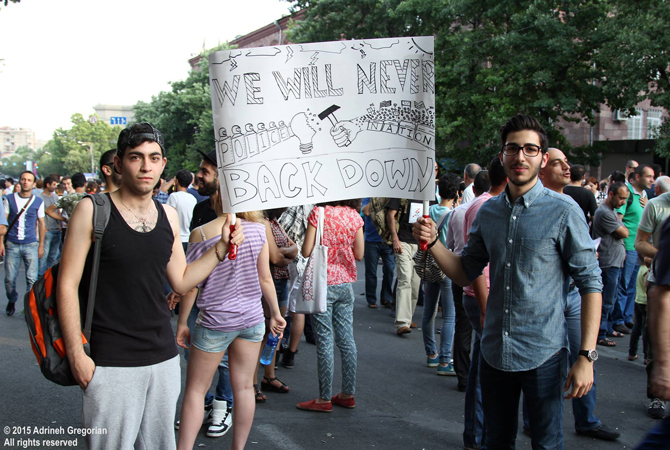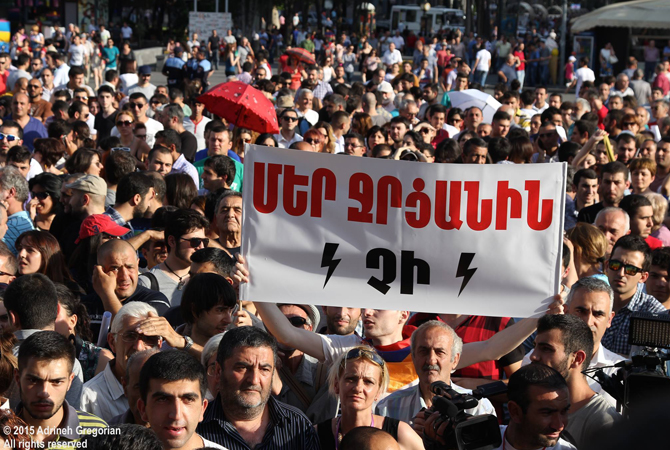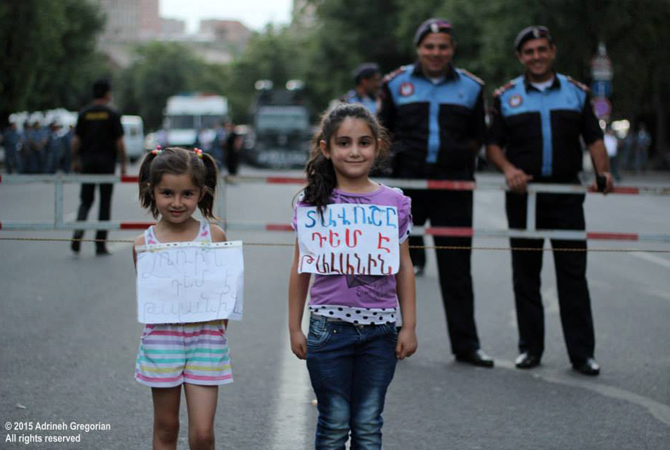
Yerevan in a Global and Neoliberal World
By Vrej Haroutounian
“Nor is the question before us whether the market is a force for good or ill. Its power to generate wealth and expand freedom is unmatched. But this crisis has reminded us that without a watchful eye, the market can spin out of control. The nation cannot prosper long when it favors only the prosperous. The success of our economy has always depended not just on the size of our gross domestic product, but on the reach of our prosperity, on the ability to extend opportunity to every willing heart -- not out of charity, but because it is the surest route to our common good. ”
President Barack Obama
With the recent Electric Yerevan grassroots movement and Greece’s referendum vote, it appears that citizens in Armenia and Greece are beginning to question the economic systems that are in place in their respective countries.
The strong-arm tactics that have kept developing countries at bay for years are beginning to tether on the edge.
After independence, Yerevan experienced swift changes in its urban landscape. What was once a city that was owned by the citizens, Yerevan saw a sudden surge of privatization in the span of few years. Currently, there are very few pieces of land in Yerevan owned by the government, as the majority of areas are privatized and encompassed in a shadowy system of ownership. Infrastructure that was once owned and operated by the state was sold off to individuals for reduced rates when there was no developed market to determine the price of assets. This trend continues to this day, where the absolute minority that controls financial wealth and political power decide what to do with the resources that belonged to the people merely 25 years ago.

As a result, organic movements by the citizens to assert their rightful ownership of these resources and reclaim their decision-making power have become common in Yerevan, following a trend across the developing countries of the world.
As civic consciousness rises in Yerevan, people begin to understand and question the forces that are changing and challenging their everyday realities for the sake of the betterment of the few.
Thus, the people begin demanding their fair share with the ubiquitous sentiment of “Menk Enk Dere Mer Yerkri" (We Are the Owners of Our Country), directly asserting that they deserve to reclaim ownership of the private property rights in their country and not simply be treated as tenants by the political and economic elite who’s systematic structure to buy, sell, resell, profit from, and mismanage state property are unveiled gradually.

"Globalization, as defined in modern times, is the reduced significance of barriers between nations, in the transference of both tangible and intangible factors, such as goods, capital, services, technology, knowledge, people and ideas." (Stiglitz, 2002).
"The cultural and social effects of globalization on individuals can be seen in the diminishing barriers of communication, media, travel, and language, as information and people travel across the world in much shorter spans of time, and are able to adjust to foreign cultures at a faster rate." (Stiglitz, 2002).
"Globalization is discussed in terms of three processes: scale, speed and cognition. Scale addresses the magnitude of economic, political, and cultural interactions that take place between societies. Speed is a conceptualization of time and space in relation to global interactions, which are condensed through advancements in technology. Cognition is the understanding and consciousness of a global perspective and the interrelation between international social, economic, and political developments." (Kinnvall, 2002).
Essentially, globalization is “a relationship between the global and the local” (Kinnvall, 2002, p.4).

Economic globalization has both homogenizing and heterogenizing effects on nations, as they react to new factors introduced by the concept.
"Proponents view globalization as the solution to international economic growth. Opponents contend that economic globalization is a one-way process, exploiting less-developed countries by using technological advantages towards colonization through liberal economic policies." (Kinnvall, 2002). Opponents argue that only a very small portion of the world is positively affected by globalization.
As Stiglitz states, “Globalization itself is neither good nor bad. It has the power to do enormous good, and for the countries of East Asia, who have embraced globalization under their own terms, at their own pace, it has been an enormous benefit….But in much of the world it has not brought comparable benefits." (Stiglitz, 2003, p.20).
There is a strong correlation between democratization and globalization. Institutional views of democracy assume that, once established in a cultural context, democracy will take root over time and flourish, leading to a liberal, global middle class that will raise its collective voice for democratic values. Though liberal, democratic governments may arise from the process of globalization, other forms of government may also flourish, as evidenced throughout the world.
Globalization has played a key role in the independence of Armenia, along with the changes in the urban landscape that followed. As the centralized Soviet economy crashed, the hegemonic problems associated with regionalization were immediately experienced in the urban landscape of Yerevan.
Entire industries collapsed and people lived in dire conditions. In the independence years, globalization acted as a sort of emergency relief system. Under the influence of globalization, the implementation of a democratic system and neoliberal free market reforms would usher in a new era in the development of Yerevan’s urban landscape.Globalization would carve its own definition into the mosaic that is Yerevan.
In order to understand why the urban landscape of Yerevan developed and changed in the way that it did, one must first understand the ideologies that motivated those changes. One ideology that has played heavily in the formation of the modern cityscape of Yerevan is neoliberalism, a product of modern economic globalization.
Contemporary definitions of neoliberalism are formed by studying its roots in history, along with its practical application.
In The Armenian Review, Levon Chorbajian defines neoliberalism as: “A set of policy prescriptions designed to create and administer the institutional arrangements which promote globalization. There are several dimensions to these arrangements. One is to break down older, nationally based protectionist policies.” (Chorbajian, 2008, p.18).
Another is to remove barriers that hinder transnational transactions in the form of materials, goods, workers, and financial assets. In A Brief History of Neoliberalism, David Harvey defines neoliberalism and explains the government’s role in establishing a neoliberal framework. He states that neoliberalism is:

"A theory of political economic practices . . . it proposes that human well-being can best be advanced by liberating individual entrepreneurial freedoms and skills within an institutional framework characterized by strong private property rights, free markets, and free trade. The role of the state is to create and preserve an institutional framework appropriate to such practices. The state has to guarantee, for example, the quality and integrity of money. It must also set up those military, defense, police, and legal structures and functions required to secure private property rights and to guarantee, by force if need be, the proper function of markets. Furthermore, if markets do not exist (in areas such as land, water, education, health care, social security, or environmental pollution) then they must be created, by state action if necessary. But beyond these tasks the state should not venture." (Harvey, 2005, p.5).
"The historic roots of neoliberalism can be traced back to classical liberal ideas. The ideas of Adam Smith provide the basis for neoliberal economic theory. Adam Smith’s concept of homo economicus states that political and economic matters are not interrelated. Economics should, in fact, occupy a higher role, since it operates harmoniously without government interference. Government should not interfere in the market, allowing citizens to conduct economic activity based on self-interest." (Stenger, 2010). He believed that the market was best suited to deal with human moral issues, such as greed, gluttony, and desire for power (Harvey, 2005).
"Neoliberalism became a strong presence amongst Western superpowers with the 1979 election of Margaret Thatcher as Prime Minister of Britain. Adhering to Keynesian fiscal policies, she moved to reorganize the social democratic political power structure that was supported by trade unions, by supporting free market competition with no union influence, reducing commitments to welfare, and increasing the privatization of public enterprises. She reduced taxes, proposed policies to increase foreign investments, and advocated for strong, individualistic policies that reduced the role of society." (Harvey, 2005).

Karaman, a geographer conducting research on the gentrification of Istanbul, explains neoliberalism as:
"A shift from welfarist policies of the Keynesian era towards a political agenda that prioritizes the unfettered operation of markets. In most general terms, this political agenda is characterized by policies aimed at privatization, deregulation, and deep cuts to social spending. While in the Global North this is primarily manifested by the gradual and selective dismantling of inclusive welfare state systems, and the abandonment of policies of full employment, in the Global South one finds structural adjustment policies imposed by the IMF and the World Bank as loan conditionality." (Karaman, 2010, p.39).
In his 2009 inaugural address, President Obama summed up the effectiveness of neoliberal policies:
"Nor is the question before us whether the market is a force for good or ill. Its power to generate wealth and expand freedom is unmatched. But this crisis has reminded us that without a watchful eye, the market can spin out of control." (Stenger, 2010, p.1).
Karaman states that neoliberal policies:
"Redefine the relation between state and the markets to the benefit of the latter; rather, it marketizes all realms of social life including state itself. In other words it is not a force that is external to the state, and therefore one that can be utilized by state and policy actor. It is a political rationality that seeks to intensify and expand the market; it is a machine of marketization that seeks to cast all dimensions of social life in terms of market exchange." (Karaman, 2010, p.42).
The overall culture that is created by the effects of neoliberal policies is one in which the individual’s wants supersede the considerations of societal wants or needs.The individual’s production of capital for the securing of his wants through competition reduce societal function, social securities and communal values, which are necessary for strong, viable communities and governments.

According to economist Khanjian (2008), the ideology of neoliberalism and its function in the process of globalization made an impact upon the urban landscape of Yerevan, as neoliberal economic policies were introduced to a country that was not yet prepared for the free market.
“Privatization before having competition and regulations generates monopolies and market failure. In the former Soviet republics, privatization generated huge monopolies which were able to control the market and raise prices drastically” (Khanjian, 2008, p.46).
Chorbajian adds, “When we conduct an objective assessment of the situation in Armenia, it becomes clear that the large majority of Armenians… experienced a massive decrease in living standards as a result of privatization and the other globalist and neo-liberalist agendas” (Chorbajian, 2008, p.29).
"The collapse of the Soviet market caused Armenia to experience low employment rates. Government assets were sold to private entities at reduced rates." (Khanjian, 2008).
Privatization affected the availability of housing in Yerevan and, as neighborhoods were gentrified, green space—previously publicly-zoned— was privatized, changing its traditional use and creating social justice issues in the urban landscape.
Space that was previously used for social interaction and outings was gentrified into space that was capable of producing capital in numerous forms of residential, retail or service-providing building structures, generating mass wealth for the few.
It is no surprise that after 25 years of independence, the new generation of Yerevan residents, armed with access to information and capable of understanding and asserting their rights under the law, have decided to collectively protect their interests and stand against the shadowy overlords of the ruinous economic and political system currently in place.
Sources:
Harvey, D. (2005). A brief history of neoliberalism. Oxford: Oxford UP, 2005.
Karaman, O. (2010). Remaking space for globalization: Dispossession through urban
renewal in Istanbul. Minnesota: University of Minnesota.
Khanjian, A. (2008). Neo-liberal economic policies and their social effects.Armenian
Review Journal Volume 50(1-4). p. 11-36
Kinnvall, C., and Jönsson, K. (2002). Globalization and democratization in Asia: The
construction of identity. London: Routledge.
Steger, B.M., and Roy, R.K. (2010). Neoliberalism: A very short introduction. Oxford:
Oxford UP.
Stiglitz, J.E. (2002). Globalization and its discontents. New York: W.W. Norton.
 Videos
Videos Photos
Photos




Write a comment